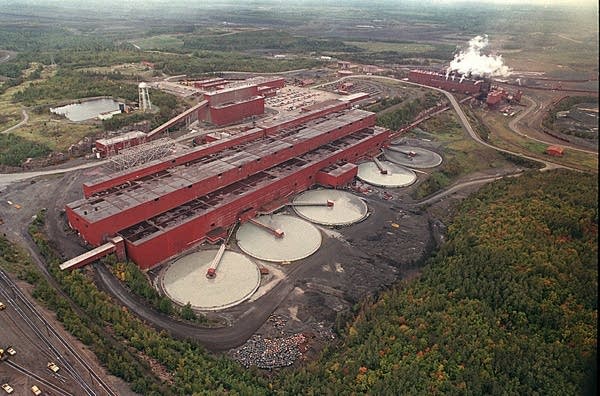Environmental lawsuits pile up as PolyMet mine crawls forward

There will be plenty of work in Minnesota in the coming months and years for environmental attorneys.
Four lawsuits have already been filed that could potentially delay the PolyMet copper-nickel mining project proposed for northeastern Minnesota. And several more are expected if the state eventually grants the mine the permits it needs to begin construction.
The suits are a key tool for environmental groups trying to block the controversial project.
Some of the plaintiffs, including the Sierra Club and Minnesota Center for Environmental Advocacy, are well-funded organizations and no strangers to litigation.
Create a More Connected Minnesota
MPR News is your trusted resource for the news you need. With your support, MPR News brings accessible, courageous journalism and authentic conversation to everyone - free of paywalls and barriers. Your gift makes a difference.
Others are small, grassroots groups, like the Save Lake Superior Association and Save our Sky Blue Waters, which along with the Duluth chapter of the Izaak Walton League filed a lawsuit in federal court challenging the U.S. Forest Service's recent approval of a land exchange with PolyMet.
"This should stop PolyMet," said Elanne Palcich, a retired teacher from Chisholm and a member of Save our Sky Blue Waters.
"This land exchange should never have gone through. It could have stopped PolyMet in its tracks long ago because the Forest Service should have done its duty. That is why we chose to do this, to hold the Forest Service accountable."
Palcich worries that PolyMet is just the first mine in line. If it ultimately goes forward, she said, other copper-nickel mines exploring in the region could follow in its wake.
Another suit from the Center for Biological Diversity challenges a "biological opinion" issued by the U.S. Fish and Wildlife Service, and contends the mine would destroy critical habitat for threatened lynx and wolves.
"This would be the first copper mine in Minnesota, and so it's highly controversial," said the center's Marc Fink, explaining why he feels so many lawsuits have been filed. "It's a whole new type of mining that Minnesota has not seen before, and nationwide it's the most polluted industry that we have."
Most lawsuits filed so far challenge the land swap Forest Service officials approved in January, a deal that's critical to PolyMet's plans.
The Forest Service agreed to trade 6,650 acres of federal land to PolyMet where it wants to dig its open pit copper mine near Babbitt and Hoyt Lakes, on the far northeastern edge of the Iron Range.
PolyMet controls the mineral rights underneath that land, but not the surface rights. In exchange, the company would give the federal government 6,690 acres of private land scattered around the region, land that by law is required to be roughly equal in value.
But two of the lawsuits filed allege the government undervalued the land it traded to PolyMet.
"There were a lot of flaws in this process," said Kathryn Hoffman, executive director of the Minnesota Center for Environmental Advocacy, which filed one of those lawsuits.
"From our perspective, many of these suits were entirely avoidable. The Forest Service had public comment on the land exchange, but they withheld information, they didn't show the public any information about the valuation of the land."
As a result, she said, instead of resolving those disputes through a public process, it's now in court.
The suits ask for different remedies. One asks the Forest Service to recalculate the value of the land it seeks to trade. Another, filed by the group WaterLegacy, asks the land exchange process be stopped and a new package put together.
What the lawsuits are not, said Hoffman, are delay tactics.
"Yes, lawsuits have the potential to draw out the process, but when those disputes aren't resolved in the appropriate way at the front end, this is the result."
But mining backers disagree.
"I think these anti-mining groups are trying to cause delay. Because they see PolyMet moving closer to being a permitted operation," said Mining Minnesota executive director Frank Ongaro.
PolyMet says the lawsuits are, in a way, a sign of progress for the company since they indicate the mine is nearing the end of its review and permitting process.
"Typically in the U.S., when you look at proposed mining projects, inevitably you see litigation, either at the end of federal decisions, or in permitting decisions as well," explained the company's Brad Moore.
PolyMet officials say the company has spent more than $200 million on that environmental review and permitting process since 2006.
"A portion of that is to make sure that we have very good science, a thorough process and review to withstand the challenges that typically come with a proposed mine project," said Moore. "We built that into our thinking and our work."
Still, litigation can mean delays. Especially lawsuits expected later in the process, when the state Department of Natural Resources makes its decision whether to grant PolyMet a permit to mine.
"Delays are never good," said Graham Davis, a professor of mineral economics at the Colorado School of Mines.
He said PolyMet has accepted debt from equity owners to fund the advancement of the project. "It's never good to go back to these folks and say any kind of cash flow from the operations of the project is going to be delayed for a year or two or three. That's never positive news."
Still, Davis said the rich copper ore asset in the ground that PolyMet controls isn't going anywhere.
The cost of mining could go up in those years, which would be bad for PolyMet, Davis added. But metals prices could also go up, which means a delay could work to PolyMet's advantage.
For its part the state of Minnesota is prepared for delays, and for additional litigation. It's already set aside $5.2 million for legal costs associated with PolyMet. And the Dayton administration has asked for several million more in this legislative session.